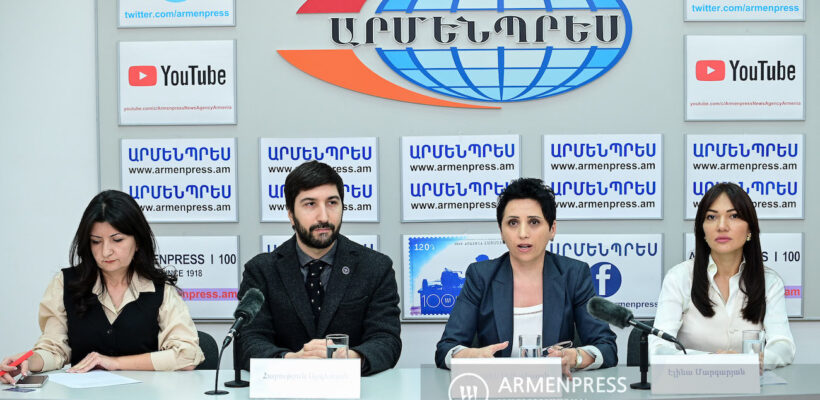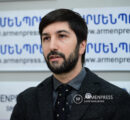
Armenia Set to Adopt Extended Producer Responsibility Legislation Developed by AUA Acopian Center’s Waste Policy Armenia Program
3 min readYEREVAN, Armenia — The Sweden-funded Waste Policy Armenia (WPA) program of the American University of Armenia’s (AUA) Acopian Center for the Environment, together with the Republic of Armenia (RA) Ministry of Environment and American Chamber of Commerce (AmCham) in Armenia, announced the introduction of Armenia’s new draft legislation on Extended Producer Responsibility (EPR) at a press conference held on February 23.
EPR is a policy tool that mandates that producers or importers of specific goods be responsible for the latter’s post-consumption waste management. While this policy has been widely implemented globally since the 1990s, Armenia, through the European Union (EU)-Armenia Comprehensive and Enhanced Partnership Agreement (CEPA), has committed to introducing a full cost recovery system for several waste streams based on EPR.
Within the scope of the WPA program, the AUA Acopian Center is supporting the RA Ministry of Environment in developing and adopting an EPR policy in the country. Several key documents and resources have already been developed by the WPA program team, including a policy brief (in Armenian) and an FAQ (in Armenian and English) on EPR.
During the press conference, Lusine Avetisyan, head of the Strategic Policy Department at the Ministry of Environment, highlighted the importance of the introduction of EPR in the country: “This is a system in the waste management sector, and with its introduction, producers and importers will take responsibility for the whole lifecycle of products. The producers will fulfill their EPR obligations by paying EPR fees based on the volume of products put on market yearly. They will be earmarked for establishing Producer Responsibility Organizations that will organize environmentally sound management of the produced waste.” She also stressed that per the EU-Armenia CEPA, the country is obliged to adopt the EPR legislation by the end of 2024.
Focusing on the practical aspects of EPR, AUA Acopian Center waste governance expert and WPA program manager Harutyun Aleptyan said, “The implementation of EPR will dramatically decrease the amount of waste sent to landfills and increase the recycling capacities in the country.” He further noted that in addition to assisting the Ministry in developing EPR legislation, the program will also develop a unified electronic platform to allow importers and producers to register in the system and report relevant data to ensure effective management of the materials.
During the press conference, speakers also discussed how EPR may impact the private sector. In this regard, AmCham Armenia President Elina Markaryan noted that the new legislation will significantly impact the country’s businesses. “Armenia is undergoing major reforms, and today we are talking about the circular economy. It is imperative to raise awareness, develop infrastructure, and change behavior. Local companies have a long journey ahead to learn from international experience so that the transition period is as easy as possible for them,” remarked Markaryan.
Together with the Ministry of Environment and AUA Acopian Center, AmCham Armenia has been involved in the development of the new legislation, especially in preparing the business community for the upcoming changes. “It is crucial to facilitate a smoother transition for businesses, minimizing any potential challenges during the implementation phase,” continued Markaryan.
The panelists encouraged the private sector to engage in the legislative process of EPR adoption and jointly address the needs and challenges for its successful implementation. The draft legislation on EPR is currently being discussed with different governmental stakeholders, and it is expected to be available to the public for further discussion in the upcoming months.
WPA is a four-year program implemented by the AUA Acopian Center for the Environment and funded by Sweden, aiming to achieve three main objectives: (1) to support the RA Ministry of Environment in developing and adopting an EPR system based on EU best practices; (2) to support the RA Ministry of Territorial Administration and Infrastructure in the development of a national model for source separation of solid waste and introduce it as a system in the town of Sevan and other target municipalities; and (3) to build sector capacity for scaling up the achieved program results.
The AUA Acopian Center for the Environment, a research center of the American University of Armenia (AUA), promotes the protection and restoration of the natural environment through research, education, and community outreach. The AUA Acopian Center’s focus areas include sustainable natural resource management, biodiversity protection and conservation, greening the built environment, sustainable energy, as well as information technology and the environment. Visit http://ace.aua.am.
Media Coverage:
[Public Radio of Armenia] Թափոնը ևս արժեք է. արտադրությունից մինչև աղբավայր մասնավորի պատասխանատվության տակ կդրվի
[H1] Բիզնեսը պետք է սկսի վերամշակել իր արտադրական թափոնները




